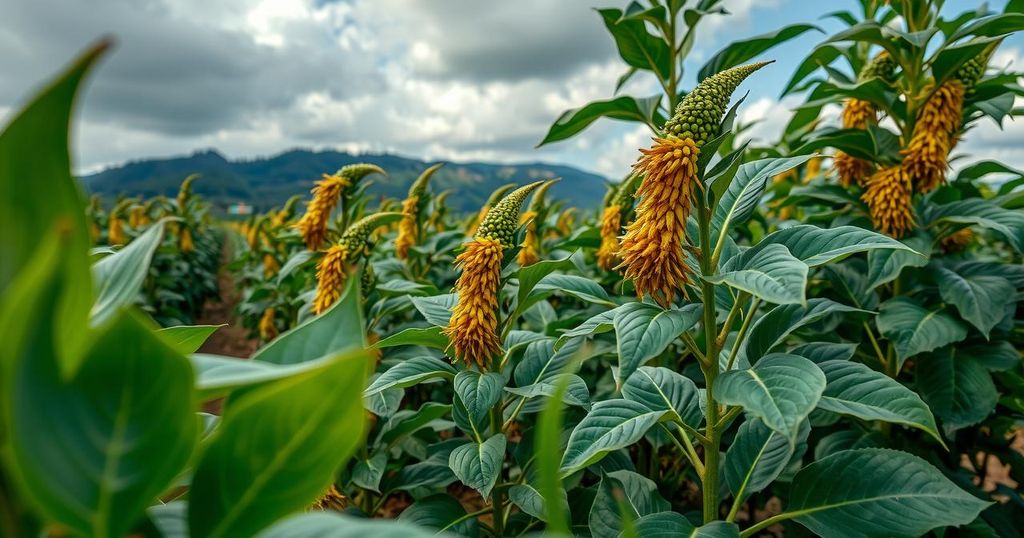As the 29th Conference of the Parties (COP29) approaches, the focus on utilizing artificial intelligence (AI) for developing climate-resistant crops in Africa intensifies. The article argues for the necessity of equitable access to AI technologies in agriculture to serve vulnerable populations, emphasizing the imperative for African governments to lobby for responsible technology deployment at COP29. AI presents transformative advantages, enabling optimized farming practices and improved food production efficiency. However, the article warns against corporate domination of these essential tools and advocates for local innovations to ensure fair distribution and access to food security resources.
The ongoing global discussions surrounding climate change, particularly at the COP29 conference, will place a significant emphasis on the transformation of agricultural practices to ensure sustainable food production. Within these discussions, the integration of cutting-edge technologies, specifically artificial intelligence (AI), emerges as a pivotal element in crafting climate-resistant crops tailored to the specific needs of Africa’s agricultural landscape. As a plant biotechnologist, I actively engage in collaborative efforts to identify and conserve essential plant genetic resources. Our mission is to preserve genes that exhibit resilience against climate change while contributing to both food security and conservation initiatives. This process involves the cryopreservation of vital plant traits—known as germplasm—as well as the maintenance of these traits in controlled environments. The application of biotechnology has ushered in innovative breeding techniques that yield crops with improved resistance, nutritional value, and longevity. Moreover, AI facilitates the analysis of extensive datasets, enabling enhanced predictions regarding plant responses to environmental stressors, consequently fostering the development of robust crops adaptable to diverse climates. However, it is imperative that the stewardship of these emerging technologies does not rest solely in the hands of corporate entities. African governments must assertively advocate at COP29 for the equitable deployment of AI in agricultural contexts to ensure that the benefits extend to marginalized communities. The role of AI in agriculture encompasses three extraordinary advantages: the ability to synthesize and evaluate vast datasets relating to environmental factors, the automation of agricultural processes to mitigate waste and optimize inputs, and real-time decision-making capabilities that enhance operational efficiency. The innovative strides afforded by AI also include breakthroughs in protein chemistry, heralded by recent developments, such as the AlphaFold platform. This platform assists scientists in crafting novel proteins, further establishing a foundation for enhancing global food security through sustainable biotechnological practices. Nonetheless, the disparities in access to these pivotal resources are stark, particularly within Africa. The continent, as it grapples with the repercussions of climate change, stands to gain tremendously from AI-driven advancements. It is of utmost importance that African leaders deliver a united message at COP29 advocating for technology that prioritizes food security for the most vulnerable populations. Corporations have a historically questionable record when it comes to equitable access and distribution of essential resources. Consequently, African governments must strive to foster local innovations and investments in climate-resilient agriculture technologies. COP29 must also ensure that as AI enhances food production efficiencies, it concurrently addresses food scarcity issues, particularly among marginalized demographics.
This article discusses the convergence of technology, specifically artificial intelligence (AI), with agriculture, emphasizing the importance of developing climate-resistant crops in Africa. The context of COP29 highlights the urgency to address food security in light of climate change, with a particular focus on how emerging technologies can foster resilience within agricultural systems while minimizing environmental impacts. As Africa faces unique challenges due to climate adversity, the article stresses the need for equitable access to AI technologies that prioritize the needs of its vulnerable populations, departing from the corporate monopolization that has historically led to inequities in food access and distribution.
In conclusion, the integration of artificial intelligence into agricultural practices presents a significant opportunity for enhancing food security and developing climate-resilient crops in Africa. African governments must proactively advocate for responsible and equitable use of these technologies at the COP29 conference, ensuring the benefits are accessible to those in greatest need. By prioritizing local innovation and investment, Africa can harness AI to address its unique agricultural challenges, thereby promoting sustainable solutions that foster resilience against climate change.
Original Source: theconversation.com






